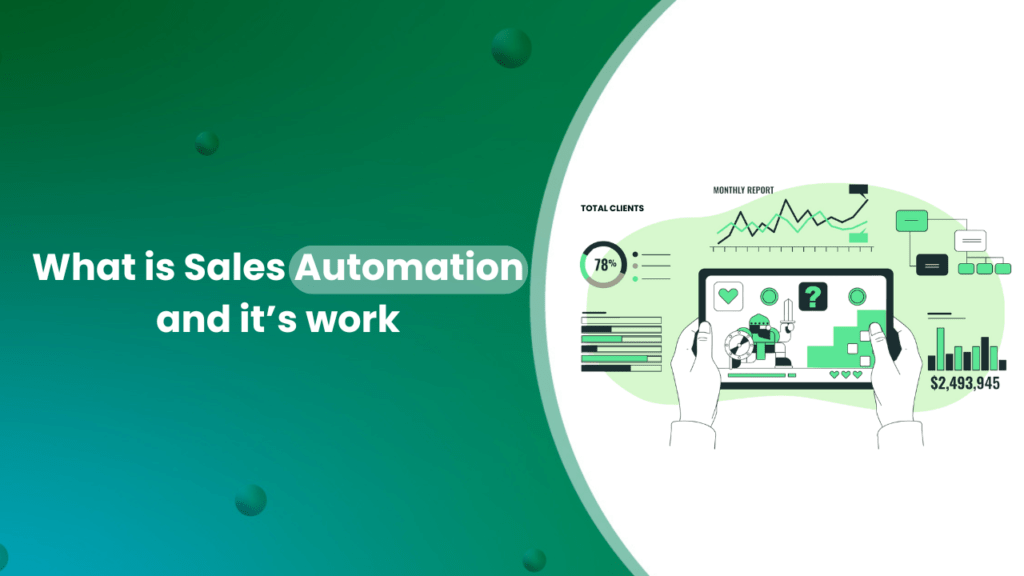What is Sales Automation? A complete Guide for 2025

Sales teams often face the challenge of managing repetitive tasks like lead follow-ups, data entry, and tracking customer interactions—tasks that can eat up valuable time. As a result, salespeople spend less time focusing on what truly drives growth: building relationships and closing deals.
Sales automation offers a solution to this problem by using technology to streamline these repetitive tasks, making the sales process more efficient. In 2025, businesses need to adapt to a world where automation can significantly boost productivity and allow sales teams to focus on high-value activities.
In this guide, we’ll explore what sales automation is, how it works, and how it can transform your sales efforts in 2025. Whether you’re new to sales automation or looking to enhance your current processes, this guide will provide you with the insights you need to increase efficiency, drive sales, and stay ahead of the competition. Let’s get started!
What is Sales Automation?
Sales automation is a feature in software that takes care of repetitive tasks essential for creating smooth and profitable customer journeys. It involves tools and software that automate processes like lead management, follow-ups, email marketing, and data entry. By automating these tasks, sales automation helps your team handle way more potential customers without getting overwhelmed. Instead of spending hours on paperwork and data entry, your salespeople can focus on actually talking to customers and making sales.
Sales automation tools come in all shapes and sizes. Some live inside software for managing customer relationships (CRM), others help find new leads, and some are email marketing wizards. No matter the tool, they all work together to automate different parts of the sales journey, from finding leads to sending those follow-up emails you almost forgot about. These tools let you handle a ton of leads at once, and even create a standardized sales process that gets better and better over time.
What is Automation in CRM Software?
Automation in CRM software refers to the use of technology to handle repetitive and time-consuming tasks within the sales process. This includes automating tasks such as lead capture, email follow-ups, task reminders, and data entry, which helps streamline workflows and improve efficiency. By automating these processes, CRM systems free up valuable time for sales teams to focus on high-value activities like building relationships and closing deals.

Statistics on CRM Automation Usage
A significant number of businesses are leveraging CRM software to automate their sales processes. According to recent studies, about 74% of CRM users report that automation has positively impacted their sales processes. Additionally, 64% of companies use CRM systems specifically to automate marketing and sales tasks, highlighting the importance of automation in driving efficiency and boosting sales productivity.
“Salespeople who use automation tools estimate they save around 2 hours and 15 minutes daily.” source : hubspot
Benefits of Sales Automation
Sales automation is a game-changer for businesses looking to improve their sales processes and boost productivity. By automating repetitive tasks like follow-ups, lead tracking, and data entry, sales teams can focus more on building relationships and closing deals. In this section, we’ll explore the key benefits of sales automation and how it can transform your sales efforts, increase efficiency, and drive business growth.
- Saves Time and Increases Efficiency
Sales automation eliminates repetitive tasks such as data entry, follow-ups, and scheduling, allowing sales teams to focus on higher-value activities. With these tasks automated, agents can spend more time engaging with leads and closing deals. - Improves Lead Management
With sales automation, leads are tracked and categorized automatically, ensuring that no potential opportunity is overlooked. It also helps prioritize high-quality leads, allowing sales teams to focus their efforts where they’re most likely to get results. - Boosts Conversion Rates
By streamlining the sales process and ensuring that prospects are nurtured with timely follow-ups, sales automation can help improve conversion rates. Sales teams can move leads through the funnel faster and more effectively. - Increases Sales Team Productivity
With fewer manual tasks to handle, sales reps have more time to focus on engaging with leads and customers. This can lead to a significant boost in overall sales productivity. - Better Reporting and Insights
Sales automation tools often come with advanced analytics and reporting features. These insights can help sales teams identify trends, evaluate performance, and refine their strategies for better results. - Enhanced Customer Experience
By automating key touchpoints such as follow-up emails and appointment reminders, you ensure that customers receive timely and relevant communication. This consistent engagement can improve the customer experience, making them more likely to stay loyal and refer others.
Key Sales Automation Features
Lead Generation and Management Sales automation tools help identify and capture leads from various sources like websites, social media, and email campaigns. These tools can also score leads based on predefined criteria, helping sales teams prioritize the most promising prospects.
Email Automation Automation personalizes email outreach by sending tailored messages to leads and customers at the right time. It also schedules follow-up emails and manages email sequences, ensuring consistent and timely communication without manual effort.
Task Automation Features like scheduling meetings, sending proposals, and automating data entry in your CRM save time and reduce errors. Automation ensures that repetitive tasks are handled efficiently, freeing up sales reps to focus on more critical activities.
Sales Reporting and Analytics Automation provides data-driven insights by generating detailed sales reports and analytics. These insights help optimize sales strategies, track performance, and identify areas for improvement, leading to better decision-making and increased sales effectiveness.
7 ways to use CRM for sales automation
Smart Lead Capture: CRM like SalesTown can automatically grab information about potential customers when they visit your website or interact with your business online. It’s like having a 24/7 receptionist who never misses a chance to collect important details.
Automatic Follow-ups: The system can send out follow-up emails or messages without you having to remember. It’s like having an assistant who always remembers to check in with potential customers at just the right time.
Task Reminders: CRM can nudge you or your team when it’s time to do something important, like make a phone call or send a proposal. It’s like having a really reliable alarm clock for your sales tasks.
Pipeline Management: The system helps you see where each potential sale is in the process. It’s like having a big, clear map of all your ongoing deals, so you always know what needs attention next.
Email Templates and Sequences: You can set up pre-written emails for different situations. The system then sends these out automatically at the right time. It’s like having a library of perfect emails ready to go, without you having to write them from scratch each time.
Meeting Scheduler: CRM can help set up meetings with customers by finding times that work for everyone. It’s like having a personal secretary who manages your calendar and coordinates with clients.
Performance Tracking: The system can show you how well you and your team are doing with easy-to-understand reports. It’s like having a scorecard that helps you see what’s working and what needs improvement.
These features work together to make your sales process smoother and more efficient. They handle a lot of the repetitive work, giving you and your team more time to focus on actually talking to customers and closing deals.
How to Choose a CRM for Sales Automation: some features to look
Choosing the right CRM for sales automation is crucial for improving your sales process and boosting productivity. Here’s what to look for when evaluating CRM options:
- Essential Automation Features Make sure the CRM offers key automation features to streamline your sales tasks. This includes:
- Email Automation: Automate various types of emails such as initial outreach, follow-ups, appointment requests, and thank-you notes. This helps keep your leads engaged and moves them through the sales funnel efficiently.
- Task Reminders: The CRM should automatically remind you and your team about important tasks, like following up with a lead or checking in on a deal. This prevents important opportunities from slipping through the cracks.
- Pipeline Notifications: Automation should alert you about changes in the sales pipeline, so you’re always up-to-date on where each lead stands and can act promptly.
- Real-Time Updates A good CRM provides real-time updates to ensure your team always has the latest information. This means:
- Sales reps have access to the most current data on client interactions.
- Teams can send timely and relevant emails based on recent activity.
- Everyone stays informed with the latest updates, avoiding miscommunication and delays.
- Automated Reporting and Analytics Look for a CRM that offers automated reporting and analytics. This feature helps by:
- Providing detailed insights into sales performance and key metrics.
- Generating reports quickly and efficiently, which is faster than manual reporting.
- Helping you make informed decisions based on accurate data.
- Personalization Capabilities Effective sales automation includes personalization features to tailor your communications. A CRM should:
- Personalize emails and messages with names and relevant details.
- Allow you to customize content for different audience segments, building stronger connections and trust with your leads.
- Integrations with Other Tools Choose a CRM that integrates well with your existing systems and tools. For example:
- If you use specific e-commerce platforms or payment processors, ensure the CRM can connect with them for seamless operations.
- Verify the CRM’s compatibility with other third-party applications you rely on, such as marketing tools or customer service software.
By focusing on these features, you can select a CRM that enhances your sales automation efforts, helping your team work more efficiently and drive better results.
Try Sales Automation Software for Free!
SalesTown CRM is your all-in-one sales automation solution. It helps you capture leads, manage your pipeline, automate follow-ups, and track your team’s performance – all in one easy-to-use platform. With marketing automation features like Email Marketing, WhatsApp Marketing. SalesTown CRM adapts to your needs, helping you close more deals with less effort.
Ready to see the benefits for yourself?
Take a 👉 Free Demo to experience the power of smart sales automation firsthand. No credit card required, and setup takes just minutes.

